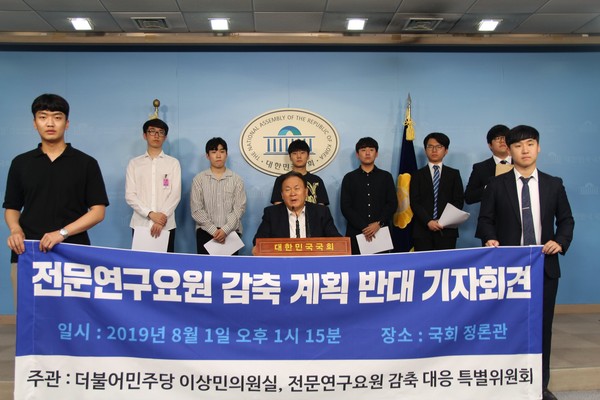The hotly-debated issue of potential reduction for the number of Technical Research Personnel (TRP) has resulted in the formation of an opposing committee and the publication of a multi-university petition against the plan.
The South Korean government requires compulsory military service for all eligible men starting from 19 years of age. While most choose to complete active duty in different branches of the military, others take alternative service options: Public Health Doctor, Skilled Industrial Personnel, Arts and Sports Personnel, and more. Out of such options, TRP has been a frequently chosen path for KAIST graduate students, with KAIST filling about 260 of the 2,500 seats available annually across all eligible Korean corporations, research centers, and universities.
TRP allows STEM researchers to substitute their conscription with about three years of employment or research at government-designated corporations, research centers, and university laboratories during or after completing their graduate degree. According to the Military Manpower Administration, the mission behind the program is “to foster, develop, and enhance the competitiveness of the national industry without affecting the number of available military personnel”. It is divided into two main types: the Master’s Program, with three years of employment at approved businesses after completing the degree, and the Doctorate Program, which requires completion and pursuit of the degree for at least three years.

The main appeal of TRP has been that students could continue their education without interruption due to conscription. The number of seats, often referred to by Koreans as “TO” for turnover, has been sharply decreasing since the program’s establishment in 1973. Since 2016, the Ministry of National Defense (MND) has suggested a gradual discontinuation of the program, stating the lack of available active military personnel as the primary reason. A recent scandal involving a KAIST researcher who reported a large proportion of TRPs for committing false or substitute attendance checks has further soured the public image of the program.
On July 9, MND announced its plans to drastically reduce the number of TOs available for TRPs. The plan outlined the downsizing of TRP positions starting in 2022, reaching 1,200 TOs by 2024.
In light of such news, the KAIST Undergraduate Association (UA), unifying with student councils from three other science and technology institutes, created the Special Committee for Actions Against TRP Downsizing. The UA conducted a survey on the students’ opinions on TRP as well as their motivation behind choosing the option. Afterwards, the committee published an open statement on July 16 and opened a petition for the withdrawal of the proposal between July 16 and 23.
The statement criticized the lack of communication and brashness of the MND, which had made the decision without consultation with the Ministry of Science and ICT, the Ministry of Education, the Ministry of SMEs and Startups, and other relevant organizations. It emphasized the crucial economic and technological contribution generated by the STEM industry in Korea and that for Korea to thrive in the competitive global market, the TRP program is “essential in preventing the outflow of gifted individuals to other countries and developing and fortifying the scientific and technological prowess of the nation.” The statement provided the results of the survey, stating that of 1,565 graduate students from five universities, 83% replied that they would have “applied to a company or an international graduate school if the TRP program did not exist”. It asserted that “increasing the number of active military personnel by 2,500 people can never be the long-term solution to the fundamental problem of naturally decreasing military personnel resources.”
The statement and petition was also cosigned by other student councils, including those of Korea University, Seoul National University, Yonsei University, POSTECH, DGIST, GIST, and UNIST. The committee members and university representatives gathered to further carry out actions against the establishment of the new plan. Until August 13, the committee attended and hosted different events to discuss and present its viewpoints on the issue. On July 23, the representatives attended the “National Assembly Discussion on the Improvement of the TRP Policy” as student panelists. The committee and the representatives also held a press conference at the National Assembly on July 25 to publicize its stance on the TRP policy. After the press conference, the representatives sat with Member of the National Assembly Sang-Min Lee to discuss further plans.
Meanwhile, the fate of the TRP program continues to be unclear and the impact of the actions from opposing parties remains to be seen.

